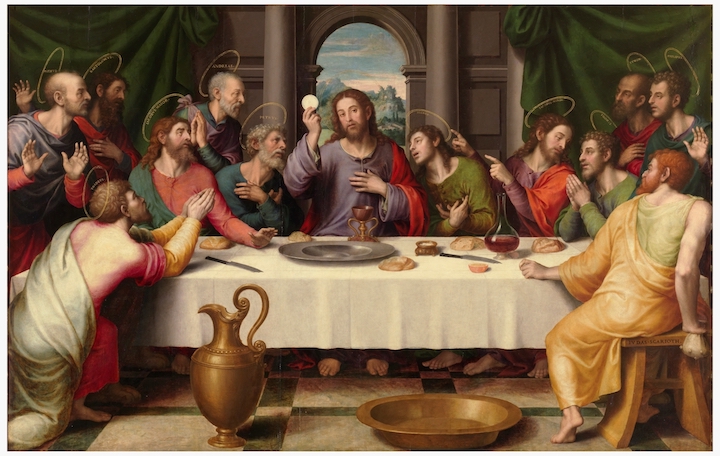Our late, beloved friend, Cardinal Francis George, made his way back to our mutual native ground, to serve with wisdom and panache as Archbishop of Chicago. On a plane once to Argentina, he found himself next to an Evangelical woman, a missionary, who turned and asked him earnestly, “Have you been saved?” He paused for a moment, because he had never had the question put so directly to him. And finally he said, “Yes, I’ve been saved by Christ, but from within a sacramental system that demands my free participation.”
Chief among those sacraments, of course, is the Eucharist. And now the matter comes back to us with more vividness precisely because we have been without it for so many weeks. Thanks to the dedication and verve of Fr. Christopher Pollard and his colleagues, I’ve been able to “attend” Mass, via podcasting, at St. John the Beloved in McLean, Virginia.
I’ve been especially grateful for Fr. Pollard giving even more time to the homilies that make our services more distinctive. And yet, I confess: I do miss the press of those friends all around me at Mass. They do help form “the body of the Church,” and I do feel fortified by their presence.
The podcasting has been comforting, but there has not been, in the sight of the camera, a single Crnkovich or Spence child; and it is highly unlikely, at any in-person Mass at St. John the Beloved, that one could be any further than a few feet from a Crnkovich or Spence.
The churches are now trying to find a way to return to the public Mass and the Eucharist. And we wonder of course: how is this going to be done in this time of COVID-19? But the question of how this is properly done cannot be detached from what we think is being offered here in the first place.
There is not a natural, but a cultivated concern about “handling” the Body of Our Lord, an awareness that comes into being only when the recognition kicks in of “what this is.” The problem dissolves, of course, if the bread is only a symbol.
Paul VI warned about the temptation to “reducing [the Eucharist] to a kind of symbolism.” He would invoke one venerable sage to remind us that “The Lord did not say: This is a symbol of My Body, and this is a symbol of My Blood but ‘This is My Body and My Blood.”
We are often reminded of how that bit of news played, even among the disciples. According to John’s report, some recoiled, saying “This is strange talk, who can be expected to listen to it?”

I heard the report years ago of an Irish priest throwing the record in the face of those people holding to sola scriptura, insisting that we be governed solely by the words of the Bible: “That is what Jesus said – this is my Body and My Blood – and I believe him!” And if He said it, why should we not believe Him – or doubt that He had the power to bear out what He had promised?
The promise is borne out now by the priest speaking, in his place, over the bread and wine. But as St. John Chrysostom said, “the priest standing there in the place of Christ says these words, but their power and grace are from God.” And yet, dare we say: from the presence of Christ in the sanctuary?
As Cardinal George observed, “The Risen Christ acts now through the sacraments because he is totally free, and not bound by space and time. He passes through a rock sealing a tomb and through closed doors. . .having passed through the great limitation of death itself. . . .He can be anywhere he wants to be, and he wants to be with us.”
Still, accomplished priests are prudent enough to know that the bread may still bear germs these days, even as the words are spoken. But even so, as Paul VI said, the bread and wine “no longer remain ordinary bread and ordinary wine.” They contain, as he insisted, “a new ‘reality’ which we may justly term ontological.”
That is, nothing metaphorical, but the real thing. But with an evident awareness of all the dubiety and sniggering over the years, he moved instantly to the anchoring ground of our conviction: “the power that accomplishes this is that same power by which God Almighty, at the beginning of time, created the world out of nothing.”
And this has been, for me, the source of enduring puzzlement when people ask, in a bantering way, whether I really “believe that stuff about the bread and wine.” I ask some of them if they really believe that God made a covenant with Abraham and went on to split the Red Sea.
With Christians, I’ll ask whether they credit the account of Jesus coming back from the dead. And in general, I’d ask if people appreciate the wonder of that Big Bang, or that moment of Creation, which brought forth this universe, with the universal laws of physics in place, or this finely balanced galaxy, allowing human life to flourish on this earth (and parts of New Jersey) – if all of this could plausibly be explained as an “accident.”
But if they can credit any of these items, it is hard to see why the bread and wine would offer a tough trick. And so yes, as I head back to Mass, I return serenely, untroubled. God bless us, one and all.
*Image: The Last Supper by Juan de Juanes, c. 1560 [Museo del Prado, Madrid]















